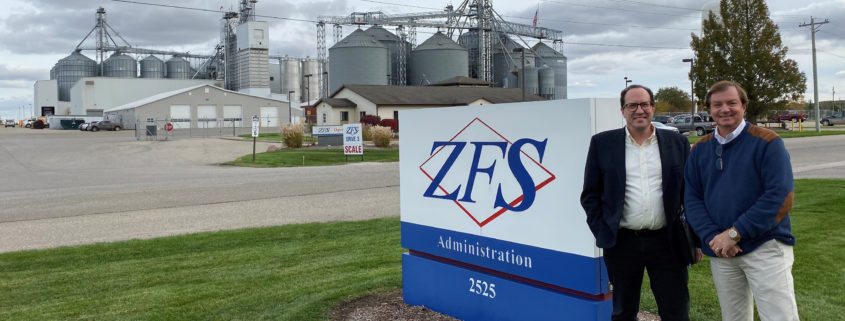SSGA talks transportation, research on Michigan tour
With more than 300 commodities grown, Michigan boasts diverse agriculture, so it’s understandable why staff from the Specialty Soya and Grains Alliance (SSGA) wanted to introduce the organization to the agricultural industry in the state.
SSGA Executive Director Eric Wenberg met with the agribusiness industry in Michigan Oct. 23-25 to learn more about Michigan’s identity-preserved (IP) industry and to see how SSGA can work for its member across the nation.
SSGA kicked off its trip at Zeeland Farm Services, Inc. (ZFS), in Zeeland, Mich., where ZFS officials shared transportation hurdles they’re facing. Among their concerns was the perception that heavy trucks damage the roads more than lighter trucks.
In Michigan, the allowable truck weight limit is 164,000 pounds on an 11-axel truck, which averages 14,900 pounds per axle. The federal limit of an 80,000-pound truck with 5 axels equals 16,000 pounds per axle. Despite the heavier federal allowance, neighboring states are adapting to Michigan’s rule to alleviate stress on roadways and increase efficiency by using fewer trucks, drivers and fuel. ZFS also shared other transportation concerns such as not being able to transport a fully loaded, 40-foot container to Chicago because of weight limits when driving between states.
“Visiting member companies like ZFS helps bring more awareness to issues they’re facing when growing, brokering and transporting identity-preserved crops across America,” says SSGA Executive Director Eric Wenberg. “By listening to our members, SSGA can bring these issues to the forefront and help create a better environment for the entire IP industry.”
Another stop for SSGA staff was to the Michigan State University agronomy farm to learn about soybean breeder Dr. Dechun Wang’s research. Wang considers the 11,000 non-GMO soybean breeding lines he planted in 2019 like his children and relayed the importance of support for public research breeding programs.
“Both public and private breeding programs are vital to the success of crops like soybeans,” Wang says. “Public programs like the one at MSU ensures that growers have unbiased research solutions to an ever-changing agricultural climate.”
SSGA also met with new Michigan Soybean Promotion Committee director Janna Frisk, and with Michigan Agricultural Commissioner Gary McDowell, to discuss the issues Michigan faces with identity preserved crops, practices, and shipping.
Soybeans are the Michigan’s top food export and 12 percent of all soybeans grown are IP. Michigan also leads the nation in production of the dry edible bean classes of black, cranberry, navy and small, red beans.







Leave a Reply
Want to join the discussion?Feel free to contribute!